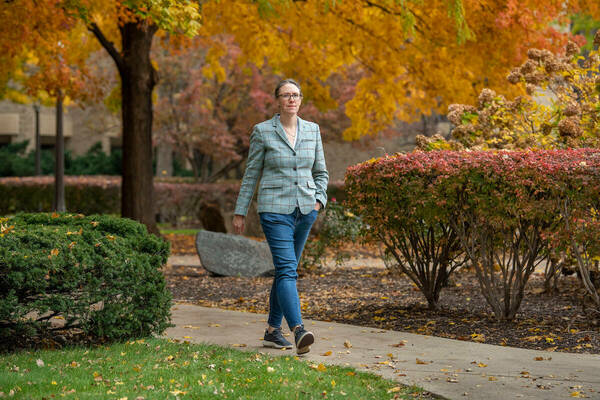
Meet Meghan Sullivan. She’s intense, goal-directed, funny (she hopes), and of course, philosophical. She also says that she’s direct to a fault, yet writes long emails.
Most know her as the Wilsey Family College Professor of Philosophy, who teaches the popular Notre Dame course, God and the Good Life. She joined the Notre Dame Institute for Advanced Study (NDIAS) as their director in 2019. Meghan’s research focuses on philosophical problems concerning time, modality, rational planning, value theory, and religious belief and her latest book, The Good Life Method, was published in January 2022.
In her own words, learn more about Meghan and how she finds time to write, why she chose to be a philosopher, the importance of coffee for her survival, and more.
Early Writer
I’m an early morning person. I usually get up around 5:30 a.m., fix breakfast, and either meet friends at the gym or (more recently, since I have some big deadlines) start writing. I try to have a block of two hours every morning while the world is still quiet where I chip away at my research projects, which for me usually means work on articles or books. I start drinking coffee at 5:30 a.m. and run on a non-stop caffeine drip through mid-afternoon. I also spend “quiet writing time” (how it appears on my calendar) blasting rock and country music through my AirPods.
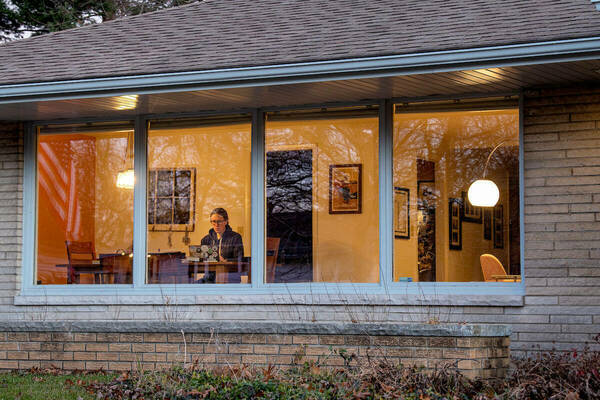
Once I head into the office (usually between 8 and 9 a.m.), the headphones are off and I spend a lot of time listening to other people, checking in on collaborative projects, advising students and research fellows, or in seminars/class. From 8 a.m. onward, it tends to be people non-stop. I am an extrovert, but I really need that focus time in the morning. I inevitably take the philosophical problem I am crunching on into conversations throughout the rest of the day. I think my colleagues are often a little annoyed with how much Plato is inflicted on them first thing in the day.
From Car to Calendar
As I pull up to campus, I check my Google calendar, which has blocks for pretty much every project or meeting I have coming up. I use my calendar directly as my to-do list. I might text some of the NDIAS team right as I get out of the car if I think they might need a bit of information for their projects that day (and I usually get a text or two as I am parking in the Hesburgh lot).
The Writing Process
I have finished two books and am working hard on the third right now. There is a bit of a lifecycle to the process. I always have a few ideas for projects simmering – I am not afraid to sketch out a draft and then stick it in a drawer.
Eventually something causes me to commit to developing an idea – an external pressure (like a contract) or more often I realize I am just really absorbed in one topic. In the first few months, I am wildly overconfident about how quickly the chapters will go. Then, for the next year, there is despair as I realize how much background research I still need to do. For that first year or so, I jump around with chapter drafts. I definitely take the approach of generating a lot of writing and then ruthlessly editing. It gets messy.
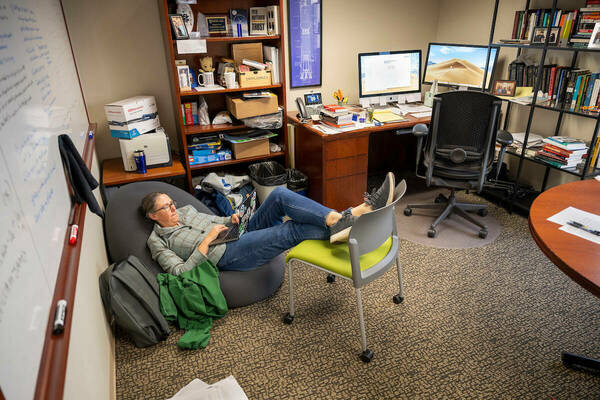
In the mature stages of a project, I find I sometimes need a few days at a time to go away and give the work my undivided attention, especially when I'm trying to fit all of the chapters together and hold the entire arc of the argument in my head. Every time I finish a big project, I'm exhausted and swear I will wait to try it again. But then inevitably I get hooked on something and rush back in...
Big Blocks
I use a method sometimes called time-blocking to help manage my time. I don’t agree to do a project until I have allocated what I think will be enough blocks on my Google calendar to finish it. I look to see where those blocks will be, and my team can see them too. Once a block is up there, it typically can’t be deleted, just moved around. This pressures me to be a bit realistic about capacity.
That said, I genuinely look forward to most of the projects I put on there. So I try to cram those blocks in. My Google calendar looks like a very exciting game of Tetris most weeks. That admittedly makes life hard for my coworkers who also have access to my calendar and are trying to schedule meetings.
Why Philosophy?
When I was in high school in North Carolina, my best friend’s father was a philosophy professor. I remember back then I thought – “I honestly have no idea what this guy does. How is this even a real job?” I was a very judgmental teenager. I went to college at the University of Virginia, completely focused on preparing for law school. I loved logical argument, loved reading and writing, and loved the sound of my own voice. My first semester, my academic advisor plugged me into a philosophy course called Issues and Life and Death. I *loved* it. I loved the way we were taught to think and to write. I loved that we were asked to try to find the best reasons for positions that we wanted to support, rather than just reporting back what other people have written on the topic.
I started taking every philosophy course I could and by my third year it was pretty clear that this was a lot more than my hobby. Near the end of college I won a Rhodes scholarship to Oxford University and that's where I threw myself headfirst into Philosophy graduate school. I’ve gotten much more sophisticated in my methods and have a much, much deeper understanding than I had when I was 18. But the questions I research and write about now are still pretty much the same topics that fascinated me back then. It is just that I have a much better grasp of how to approach them now – and now I am teaching others how to do it.
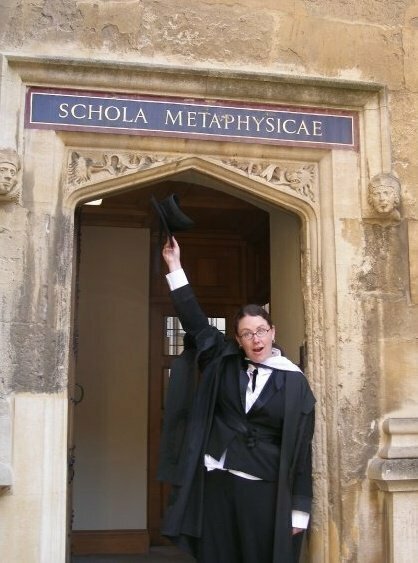
Preparing to Teach
I spend a lot of time thinking about where I want to get the students in that hour (or three) that I have them. For example, I might think before class, “Here are where my students are this week: they are confused about the Kant reading, they should feel confident taking apart this case study about Amazon workers, and they should have a first idea for the paper they are writing.” I tell them up front: “in this class period, we are going to work together on hitting these three goals.” My whole lesson plan will then be designed around that.
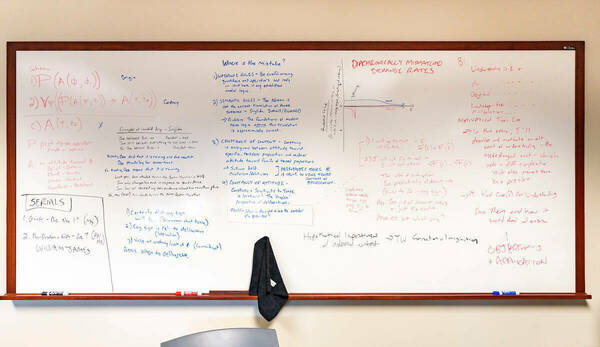
An upshot of being very experienced with the material I teach and having now taught *a lot* of students, I can be confident and adaptable to their needs. I have the lecture I have planned for the day, but I almost always have two or three other ideas for lessons I could give if that’s where they are this week. And with the NDIAS seminars, I get a massive amount of help from my colleagues.
New at the NDIAS
The NDIAS is in a growth spurt and building out its interdisciplinary research fellowship program. We have some really fantastic ideas and pilot projects, but we need infrastructure to be sustainable. My team and I spend a lot of time appreciating the wonderful projects coming out of the Institute now but also planning intensely for that future. I hope to see us take a big step ahead in that planning process this year.
Eat, Pray, Teach
I pack a lunch cooler at the start of the week and pick away at it on my breaks – usually full of leftovers from the weekend. I don’t have a very predictable lunchtime and I often eat quickly at my desk between meetings. But I try almost every day to take a walk and clear my head. I visit the Grotto nearly every day to pray. I typically get a coffee on the way back over to the office.
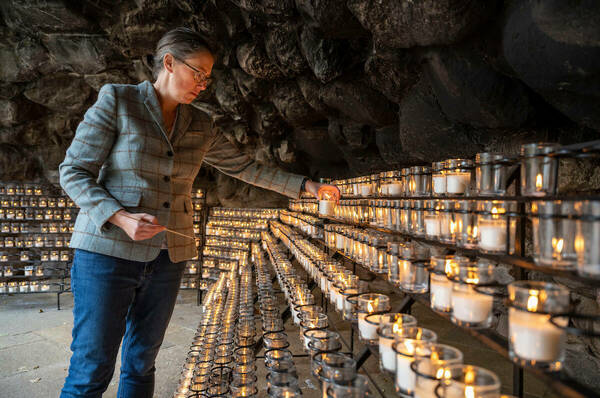
Always an Agenda
Every meeting needs an agenda! My team and my colleagues make fun of me, because we’ll have a fifteen minute friendly check-in meeting on the calendar and the night before I will ask: so where is the agenda? I love it when I am going to someone else’s meeting and they give me an agenda ahead of time. I always want to know… what are the goals? Where might there be challenges? I like having some lead time to think about my own questions for the group.
Planning Ahead
When I make a big decision (taking on an administrative job or an editorship, moving, whatever), I clear out a block of quiet time and try to really imaginatively walk through what life will be like in the new option. So for example, before taking the job at NDIAS, I spent a few hours every night for weeks thinking through what my tasks in the new job would be, what I would find energizing and what I would find hard, what I didn’t really understand, what I could offer. I called friends in similar positions and peppered them with questions about their day-to-day life. I read everything I could get my hands on.
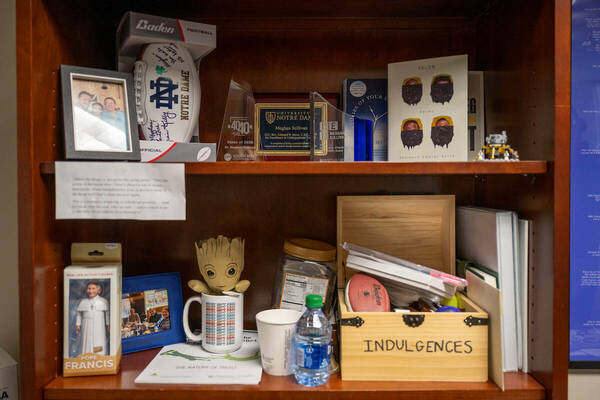
With big decisions, after “living in it” for a bit, I also take some time to reflect, is this where I am being called to go right now? What evidence do I have for that? I don’t really make pro/con lists. I usually have a sense of confidence and peace about a decision at the end of this process of “trying it on'' and praying about it.
Team Player
Research, teaching, and administration are all team sports, and for the big goals, you have to depend on other people, hold them accountable, and be accountable to them in turn. I spend a lot of time asking for help and collaboration on projects. I also spend a lot of time thinking about what kind of help I might need far in advance, i.e. in the next academic year, for projects at work to be successful. The key to balance, I think, is growing in confidence to predict and plan for what you will need down the road. And knowing who you can count on when there are surprises and obstacles along the way.
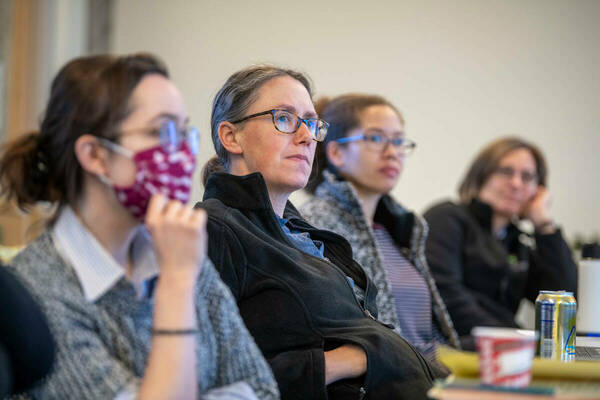
The Best Part of My Job
It is extraordinarily rewarding to be part of a team of very kind, creative, and driven people who are inspired to build things together.
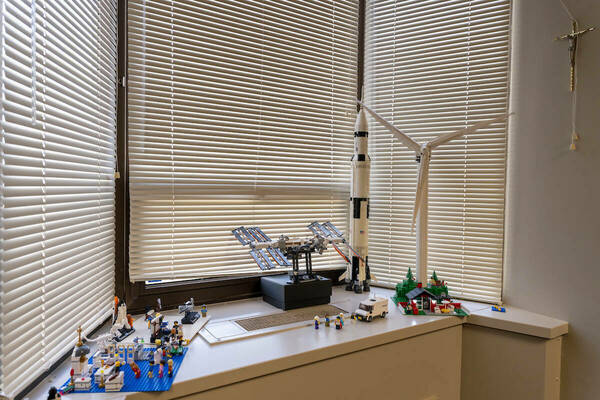
A Little Bit Everywhere
Throughout the day, I am mostly up in the NDIAS offices in Flanner, in our seminar room in Hesburgh Library, or smeared across campus for meetings. It’s a bit variable when I punch out. If we have an Institute event or I am teaching an evening class, I might be on campus until 8 or 9 p.m. If it is an event-free day, I typically leave campus around 5 p.m.
Trading Anxiety for Excitement
I have the privilege to mentor a lot of graduate students and pre-tenure folks, which often leads me to think about how my approach to work has changed as I have moved through the various milestones. One thing I tell my students is that the workload only increases over time, but you hopefully change in ways to keep pace. Over my career, I have developed a much more accurate view of how I work and how long it takes me to see projects to the finish line. Also, when you are an assistant professor, you are more often than not being guided by external forces – deadlines for your tenure case, journal processes, and schedules, there are a lot of deadlines outside of your control. That caused me some stress. Now a lot of those deadlines are self-imposed and more a source of excitement than anxiety.
Professional Accomplishments
I just finished my second book – The Good Life Method – written with my colleague Paul Blaschko, assistant teaching professor in Philosophy, which came out with Penguin Press in January. We are in the busy but truly fun phase with that project - giving talks, interviews and signings, and writing follow-up articles. I am really proud of the book and glad it is out in the world.
Many people associate philosophy with boring dead Greeks and Germans and incomprehensible technical terms. But philosophy is, first and foremost, a method that over 2,000 years people have used to help themselves live better lives. It is meant to be a very rewarding, personal, and deeply practical subject.
I hope our readers will come to my new book thinking, “I want to try out some philosophical experiments in my own life in 2022." We will give you a bunch of suggestions and background to help. And after all we have been through in the past two years, I really believe readers find something new here that will unlock a bit more of the examined life for them.
Switching the Schedule
One of my research focuses is time and rational planning, but I’m actually a pretty poor example of rational time management by the end of the day. I intentionally waste so much time in the evenings. I might head out for a meandering walk or a bike ride after work. I connect with my neighbors and friends and sit around for a few hours talking. Or I’ll cook some dinner, watch tv, and process emails. By the time 5 or 6 p.m. rolls around, I’ve usually been really schedule-focused all day. I really enjoy reading philosophy and the news, thinking about projects, talking with friends and coworkers… but on a completely unhurried schedule. That's also how I like to spend my vacations.

Outside the Office
My favorite day of the week is Saturday. I make a huge batch of homemade pancakes every Saturday morning. I will spend the entire morning reading the news. I’ll spend an hour or two with friends at the gym then typically go on an adventure by bike or car. At points throughout the day, I’ll end up talking with my family by phone (they all live in the South and Northeast) and hear about their dramas over the past week.
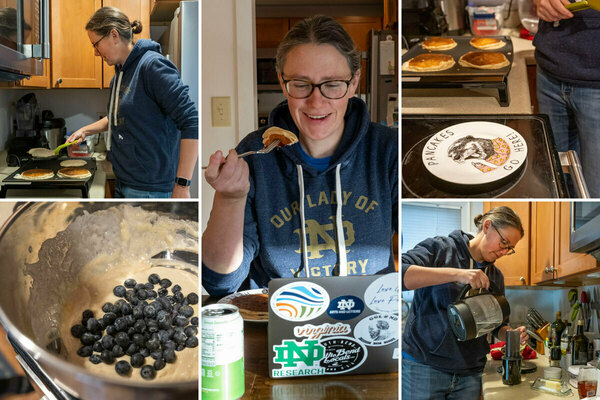
I recently survived a week-long backcountry canoe trip in the Boundary Waters with my neighbors. It involved a lot of sleeping on the ground, purifying your own drinking water, and moving heavy canoes and food barrels through mud. I had a high sense of accomplishment when we returned to civilization.
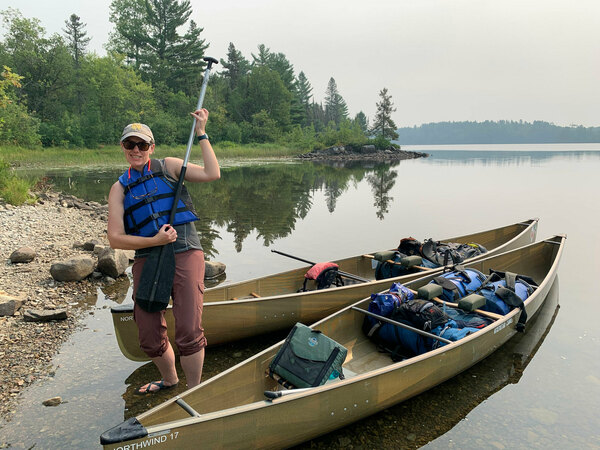
Dreaming of Emails
I will start getting into sleep mode by 8 or 9 p.m., assuming there is no nighttime event. All of the “productivity research” says you shouldn’t bring your technology into bed, but I wind down right in front of my laptop. I usually spend the last hour of the night reading newspapers (New York Times, Wall Street Journal) and watching YouTube clips. I fall asleep with my glasses on half the time. I will assiduously try to avoid email right before going to sleep, at the risk of dreaming about emails.
This story is a part of the “Routine of a Researcher'' story series from Notre Dame Research, which highlights faculty at the University of Notre Dame and their day-to-day activities on and off-campus. The goal is to showcase both the nitty-gritty of a faculty member’s unique schedule and provide supportive examples of how they balance the many competing priorities of work and personal needs. To nominate a Notre Dame faculty member for inclusion, please contact Joanne D. Fahey, Director of Communications, at fahey.17@nd.edu.